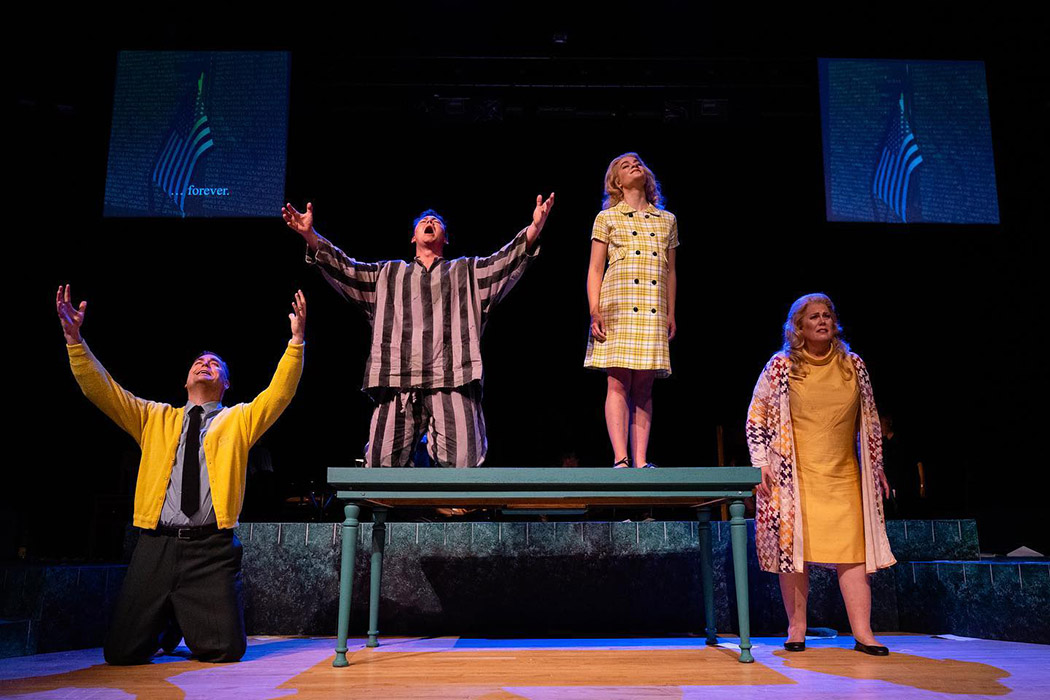If there were any doubts that Knoxville Opera would be seizing a moment of transition and a change of direction with its new artistic team this season, those doubts were quickly banished this past weekend with their season opening production of Glory Denied. From composer Tom Cipullo and based on a book by Tom Philpott, this work from 2007 represents a distinct departure from the company’s history of content that has been chiefly drawn from the classic operatic repertoire. Certainly this is the company’s first contemporary American opera in recent history. Glory Denied is based on the true story of Colonel Floyd “Jim” Thompson, an American soldier who was held as a prisoner of war in Vietnam from 1964-73, thus earning him the sad distinction of being America’s longest-held prisoner of war.
Because of this production’s tie-in to the Medal of Honor Celebration held this year in Knoxville last week, Knoxville Opera was locked into performance dates that were unavailable in its usual venues of the Tennessee or Bijou theatres. As a result, KO staged Glory Denied in the University of Tennessee’s Cox Auditorium, the 977-seat music performance hall in the Alumni Memorial Building. While the current Cox stage is not really equipped for theatrical performances, the company, under its new producing director Dean Anthony, found ways past most of the staging compromises and managed a proverbial silk purse out of a sow’s ear.
In fact, every “production” aspect of this Glory Denied earned a superlative. Four singers managed younger and older versions of Thompson and his wife, Alyce. The younger Thompson (tenor John Riesen) and younger Alyce (soprano Emma Marhefka) are written by Cipullo in lighter, brighter, and more innocent tones, depicting not only the fantasy of remembrance, but the defiance of youth and the optimism of domestic normality before it is shattered. The older Thompson (baritone Craig Irvin) is worn down, not only by the brutality of the years of imprisonment, but by what he finds when he returns home. Irvin’s character has been burnished vocally, displayed here by Irvin with a golden richness carefully twisted by powerful pangs of angst and disappointment. Unsure how—or whether—to blame, he returns hoping—futilely—to have the life that he enjoyed before. The older Alyce (soprano Caroline Worra), too, is worn down by governmental limbo she finds herself in with her husband declared MIA, and the obvious loneliness she felt, leading to the inevitable domestic consequences. Worra offers up a deliciously darker and beautifully powerful Alyce, one whose personal ordeal has slowly transformed her emotional state into deep resentment both for her husband and her treatment as a MIA wife.
Dean Anthony’s strategically powerful staging was centered around four areas, one for each character, each with a small, square video screen overhead for abstract images and the characters’ sung text. Tying the text to the characters seemed to be all but imperative for comprehension. The minimal but truly effective set of platforms, as well as the lighting and projections were handled with cleverness by Tlaloc Lopez-Watermann.
Cipullo’s vocal language is, most assuredly, in a contemporary idiom, but one that generally works for his characters and his dramatic moods. As a result, his transitions into traditional melody come as something of a notable shock. An aria from the older Thompson listing his irritations with the cultural changes in American life, was not just melodic, but strangely comic at a moment that was anything but light-hearted. Admittedly, Irvin sang it with a beautiful edge of lyricism, but one couldn’t help questioning Cipullo’s derivation of the musical idea.
The 9-piece instrumental ensemble, positioned upstage of the acting area, consisted of Knoxville Symphony Orchestra principal players under the crisp direction of Steven White. The ensemble handled Cipullo’s adventurous harmonic constructions impressively, all the while nicely balanced against the singers downstage.
Knoxville Opera, and its new executive director Jason Hardy, has gone to great lengths to indicate that contemporary opera is an expansion into fresh musical territory for them, but is certainly not the feared exclusive direction for the future. In fact, the 2022-23 season continues in November with Lehar’s operetta The Merry Widow, produced in partnership with the UT Opera Theatre, at the Tennessee Theatre. April 2023 takes KO back to the Bijou with Mozart’s The Marriage of Figaro.








